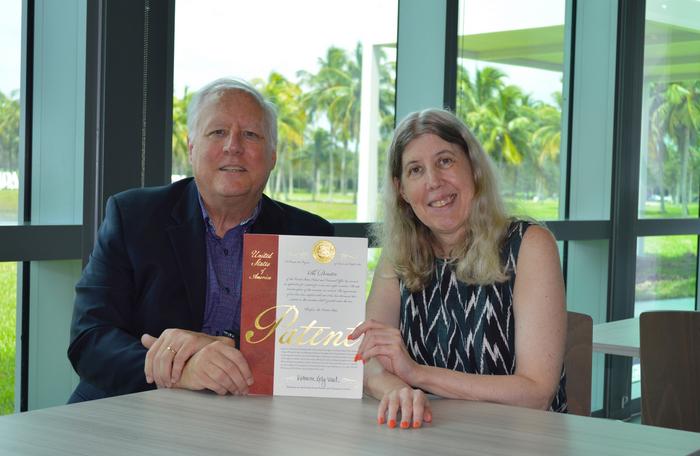According to the Substance Abuse and Mental Health Services Administration, approximately 40 million people in the United States had a substance use disorder in 2020. In addition, over the last decade, the prevalence of opioid addition has increased to epidemic levels. Unfortunately, therapeutic interventions for the treatment of addiction remain limited.

Credit: Florida Atlantic University
According to the Substance Abuse and Mental Health Services Administration, approximately 40 million people in the United States had a substance use disorder in 2020. In addition, over the last decade, the prevalence of opioid addition has increased to epidemic levels. Unfortunately, therapeutic interventions for the treatment of addiction remain limited.
Florida Atlantic University’s Randy D. Blakely, Ph.D., and Maureen K. Hahn, Ph.D., have received a patent from the U.S. Patent and Trademark Office for a novel method to identify therapeutic agents to treat addiction. The invention, related to the fields of pharmacology, medicine, neurology and psychiatry, targets the protein MBLAC1, which the Blakely lab identified as the mammalian form of a gene the group first identified in worms as a modifier of signaling by the neurotransmitter dopamine.
“The majority of drug addiction research has focused on dopamine signaling and how changes downstream of dopamine action eventually lead to compulsive drug seeking,” said Blakely, executive director of the FAU Stiles-Nicholson Brain Institute, the David J.S. Nicholson Distinguished Professor in Neuroscience, and a professor of biomedical science in FAU’s Schmidt College of Medicine. “However, we found evidence in the worm model C. elegans that a gene expressed in glial cells supports the health and function of dopamine neurons and suspected its actions in humans might also relate to addiction.”
Glia are non-neuronal cells in the brain and peripheral nervous system well known to support neuronal metabolism and the rapid transmission of impulses.
“We now know that glial cells support brain function in many more ways, including aspects of the plasticity and drug responses of nearby neurons. Dopamine neurons are no exception,” said Blakely.
Over the past two decades, the Blakely lab has utilized the simple but powerful worm model for its ability to yield insights into the genes and proteins that regulate dopamine signaling. In 2012, the group identified a new gene they named swip-10, as the loss of this gene produces “Swimming-induced paralysis” or Swip. DNA analysis of swip-10 revealed conserved sequences that comprise a Metallo-b-lactamase Domain (MBD), an element that was also found in an uncharacterized human gene termed MBLAC1.
“Metallo-b-lactamases are well known to microbiologists for the ability of bacteria to degrade antibiotics such as penicillin and thereby contribute to antibiotic resistance,” said Blakely. “However, in more complex organisms, MBD has been repurposed to digest many other molecules. So, we suspected that drugs targeting human MBD-containing proteins would likely have non-microbial effects, perhaps even medically relevant ones.”
Indeed, prior to the Blakely lab identifying swip-10, scientists studying addiction were learning that the beta-lactam antibiotic ceftriaxone could diminish several brain changes that arise with chronic use of addictive drugs. What they didn’t know was what protein ceftriaxone bound to in the brain. In 2018, the Blakely lab reported that the protein made by the MBLAC1 gene is a major, if not exclusive, target for ceftriaxone. More recent data from mice engineered to eliminate MBLAC1 protein expression demonstrate a requirement for the protein in the ability of cocaine to establish long-term behavioral changes that reflect brain alterations scientists believe contributes to the drug’s abuse liability.
Remarkably, the Blakely lab has discovered that loss of swip-10 also causes age-dependent neurodegeneration.
“We think these findings link to recent studies implicating MBLAC1 as a contributor to risk for certain forms of Alzheimer’s disease as well as the ability of ceftriaxone to display neuroprotection in animal models,” said Hahn, co-inventor on the patent and a research associate professor of biomedical science in FAU’s Schmidt College of Medicine. “We are very excited that what began as a simple genetic screen using worms may be leading us to insights into a number of different brain disorders.”
– FAU –
About Florida Atlantic University:
Florida Atlantic University, established in 1961, officially opened its doors in 1964 as the fifth public university in Florida. Today, the University serves more than 30,000 undergraduate and graduate students across six campuses located along the southeast Florida coast. In recent years, the University has doubled its research expenditures and outpaced its peers in student achievement rates. Through the coexistence of access and excellence, FAU embodies an innovative model where traditional achievement gaps vanish. FAU is designated a Hispanic-serving institution, ranked as a top public university by U.S. News & World Report and a High Research Activity institution by the Carnegie Foundation for the Advancement of Teaching. For more information, visit www.fau.edu.




